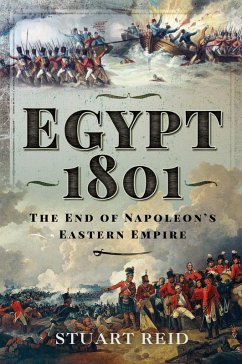The first campaign medal awarded to British soldiers is reckoned to be that given to those men who fought at Waterloo in 1815, but a decade and a half earlier a group of regiments were awarded a unique badge - a figure of a Sphinx - to mark their service in Egypt in 1801. It was a fitting distinction, for the successful campaign was a remarkable one, fought far from home by a British army which had so far not distinguished itself in battle against Revolutionary France, and one moreover which had the most profound consequences in the Napoleonic wars to come. In 1798 a quixotic French expedition led by a certain General Bonaparte not only to seize Egypt and consolidate French influence in the Mediterranean, but also to open up a direct route to Indian and provide an opportunity to destroy the East India Company and fatally weaken Great Britain. In the event, General Bonaparte returned to France to mount a coup which would eventually see him installed as Emperor of the French, but behind him he abandoned his army, which remained in control of Egypt, still posing a possible threat to the East India Company, until in 1801 a large but rather heterogeneous British Army led by Sir Ralph Abercrombie landed and in a series of hard-fought battles utterly defeated the French. Not only did this campaign establish the hitherto rather doubtful reputation of the British Army, and help secure India, but its capture en route of the islands of Malta gained Britain a base which would enable it to dominate the Mediterranean for the next century and a half. This little understood, but profoundly important campaign at last receives the treatment it deserves in the hands of renowned historian Stuart Reid.
Dieser Download kann aus rechtlichen Gründen nur mit Rechnungsadresse in A, B, BG, CY, CZ, D, DK, EW, E, FIN, F, GR, HR, H, IRL, I, LT, L, LR, M, NL, PL, P, R, S, SLO, SK ausgeliefert werden.









